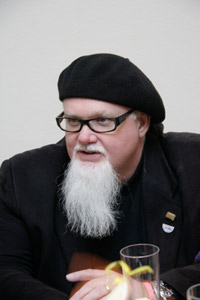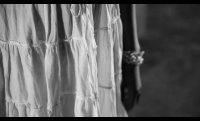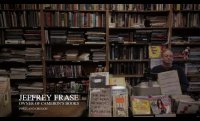Poems, Stories, Entire Books Welcome in Winter Anthology Contest
The Winter Anthology, a "collection of contemporary literature informed by history and older art, twenty-first-century science and philosophy, and the ending of print culture," is accepting entries for its 2011 contest.
All submissions will be considered for publication online and subsequently in Volume 2 of the anthology, alongside the poetry or prose of the winning writer, who will be awarded one thousand dollars.
This year's judge is poet Lisa Russ Spaar, a professor at University of Virginia whose poetry books include Glass Town (Red Hen Press, 1999), Blue Venus (Persea Books, 2004), Satin Cash (Persea Books, 2008), and the forthcoming Vanitas, Rough, which Persea will release next year. Spaar has also published essays in Shenandoah and Virginia Quarterly Review, and her poetry appeared in Volume 1 of the Winter Anthology, with poems by Lucie Brock-Broido, Jean Valentine, and Charles Wright and novel excerpts by Karl Ove Knausgaard and Magdalena Tulli.
Works of any genre are eligible for the contest. Each entry, which may range from two poems or a single essay or story to an entire book of up to fifty pages, must be accompanied by a ten dollar reading fee.
The address for print submissions and a link to the Winter Anthology's Submishmash entry page (which requires writers to submit an eleven dollar entry fee) are posted on the contest website. Entries must be submitted by November 15, and a winner will be announced in the winter.





 The Detroit poetry scene started to gain recognition among nontraditional audiences in 1987. Shortly thereafter, P&W expanded to the city to further stimulate the funding culture and help local arts organizations such as the National Writer’s Voice Project, Terry Blackhawk’s school-aged
The Detroit poetry scene started to gain recognition among nontraditional audiences in 1987. Shortly thereafter, P&W expanded to the city to further stimulate the funding culture and help local arts organizations such as the National Writer’s Voice Project, Terry Blackhawk’s school-aged
 We plunge into our topic: "Telling the Stories of our Lives: Writing the Personal Memoir." After some discussion, we start an exercise. Following the guided visualization, everyone is asked to write from a childhood memory. As we’re beginning, a woman and her twelve-year-old daughter join us, apologizing for their lateness. I initiate introductions, settle the latecomers into chairs, bring them briefly up to speed, then encourage them both to start writing. The mother goes ahead, but the girl just sits, looking scared and confused. We’d advertised the workshop to all ages, but she's the only youngster. Her mother said she loves to write, but right now I know exactly how she’s feeling, afraid of embarrassing herself, of doing it "wrong."
We plunge into our topic: "Telling the Stories of our Lives: Writing the Personal Memoir." After some discussion, we start an exercise. Following the guided visualization, everyone is asked to write from a childhood memory. As we’re beginning, a woman and her twelve-year-old daughter join us, apologizing for their lateness. I initiate introductions, settle the latecomers into chairs, bring them briefly up to speed, then encourage them both to start writing. The mother goes ahead, but the girl just sits, looking scared and confused. We’d advertised the workshop to all ages, but she's the only youngster. Her mother said she loves to write, but right now I know exactly how she’s feeling, afraid of embarrassing herself, of doing it "wrong."